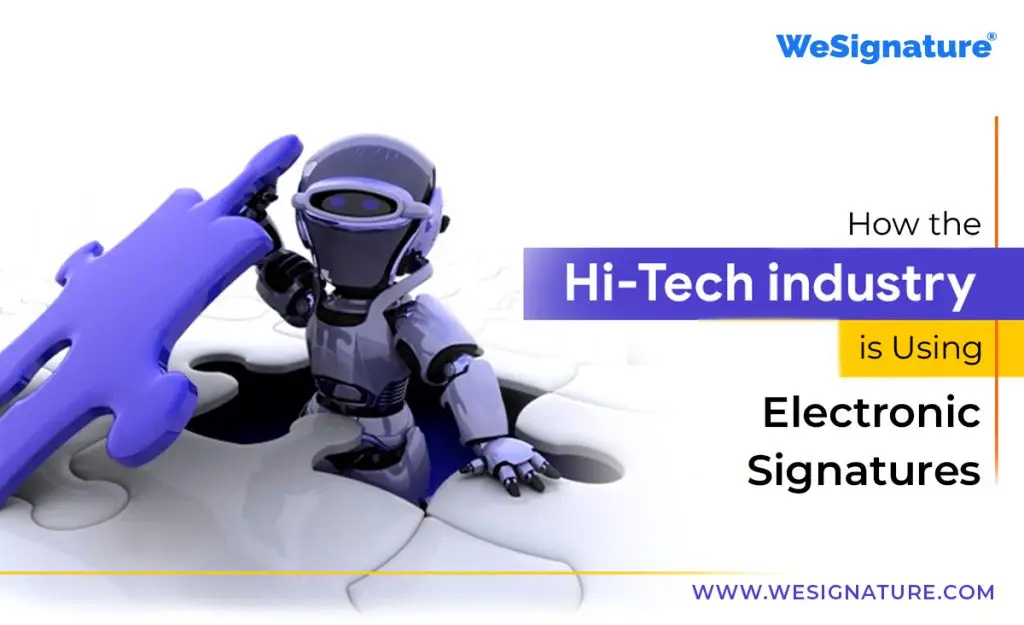How the High-Tech Industry is Using Electronic Signatures

Introduction:
Staying one step ahead is essential to success in the ever-evolving technology industry. One of the major technological advances that has changed workflows and increased efficiency is the widespread adoption of electronic signatures. In this blog post, we’ll delve into how Electronic Signatures For Tech Industry are transforming the tech sector by streamlining processes, improving security, and creating a more resilient and flexible work environment.
The Need to Optimize Processes:
As high-tech companies expand and operate globally, the need for streamlined and efficient processes becomes paramount.
Traditional paper signatures can lead to delays and inefficiencies, especially when dealing with contracts, agreements, and other legal documents.
Electronic signatures provide a comprehensive solution to these challenges, allowing organizations to speed up workflows, reduce turnaround times, and improve overall productivity.
Accelerate Contract Lifecycle Management:
The technology industry is known for its fast-paced environment, where transactions and collaborations evolve rapidly.
Electronic Signatures For Tech Industry play an important role in accelerating contract lifecycle management from the initial negotiation phase to final execution.
By eliminating the need for a physical signature and time-consuming document exchange, electronic signatures enable technology professionals to close deals faster and seize new opportunities.
Increased security and compliance:
In an era where data breaches and cyber threats are on the rise, maintaining the highest level of security is non-negotiable for high-tech companies.
Electronic signatures are equipped with reliable encryption and authentication tools that ensure the integrity and confidentiality of confidential information.
Additionally, many electronic signature solutions comply with industry regulations and global standards, giving technology-based organizations peace of mind that their digital transactions are legally binding and secure.
Enabling Remote Work and Collaboration:
The emergence of electronic signatures has become especially relevant in the context of the global transition to remote work.
Technology professionals often collaborate with teams located in different time zones and geographic locations.
Electronic signatures allow people to sign documents anywhere in the world, eliminating the need for physical presence and enabling seamless collaboration.
This newfound flexibility not only improves productivity but also helps create a more inclusive and diverse workforce.
Also Read | How E-Signatures Are Reducing Paper Waste in 2024
To Reduce Your Environmental Impact:
Sustainability is a growing concern in the tech industry, and e-signatures fit perfectly with the industry’s commitment to reducing its environmental impact.
By eliminating the need for paper, printing, and delivery, Electronic Signatures For Tech Industry contribute to significant reductions in carbon emissions.
This green approach resonates with the values of many high-tech companies and their stakeholders, making electronic signatures an attractive and responsible option for businesses committed to sustainability.
Integration With Existing Technologies:
The tech industry relies on advanced technologies, and electronic signatures integrate easily into existing ecosystems.
Electronic signature platforms will provide higher levels of engagement, whether they are coupled with cloud storage solutions, project management tools, or customer relationship management (CRM) systems.
This integration improves the overall efficiency of high-tech workflows by creating a holistic and interconnected digital environment.
Meeting Customer Expectations:
As technology companies strive to meet the rising expectations of their customers, providing a seamless digital experience has become essential. App development cost is a significant factor in achieving this goal, as it can impact the quality and functionality of the final product.
Electronic signatures enhance the customer experience by simplifying registration, contract approval, and service agreements.
This improves customer satisfaction and positions high-tech companies as tech-savvy and forward-thinking.
Real use cases:
As examples of practical applications of Electronic Signatures For Tech Industry, let’s look at a few real-life use cases:
A. Sales contracts: Sales teams in the technology industry often deal with complex contracts and agreements.
Electronic signatures facilitate a faster and more efficient sales process, allowing you to close deals faster.
b. Filing Patent Applications: Protecting intellectual property is of utmost importance in the innovation industry.
Electronic signatures simplify the patent application process, reduce paperwork, and speed up approvals.
c. Vendor agreements: High-tech companies collaborate with suppliers.
Electronic signatures simplify the negotiation and execution of agreements with suppliers, ensuring smooth and transparent relationships.
d. Adaptation of employees: In high-tech organizations, onboarding new talent requires a lot of paperwork and paperwork.
Electronic signatures streamline the onboarding process, making it faster and easier for both employers and employees.
Learn More | How to Create a Handwritten Signature Online
Conclusion:
In conclusion, the introduction of electronic signatures represents a significant paradigm shift in the technology industry’s approach to document and workflow management.
By embracing this digital transformation, technology companies can achieve unprecedented efficiency, improve safety, and contribute to a more sustainable future.
As the industry evolves, electronic signatures will remain key to innovation, collaboration, and operational excellence.



